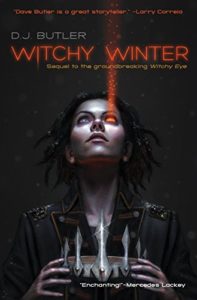 Review
Review
Title: Witchy Eye
Author: D. J. Butler
Baen, 2018. Epic fantasy novel.
Reviewed by Theric Jepson
Witchy Eye was a quality novel: a fine read—enjoyable, intelligent, new.
Witchy Winter however, though I didn’t realize this until the end, is a step above. It is a deeply satisfying read. Although I like Butler’s writing, I’ll admit to a bit of skepticism that this novel was better than the steep competition it was up against for the 2018 AML Novel Award, but I now repent. I still haven’t read those other two novels but two authors I admire, but it’s hard to deny they’re now underdogs.
The richness of both the individual characters and the world in which they inhabit is utterly intoxicating. I will admit to a personal interest in various Mormony aspects of the text (two of which I’ll discuss in a moment), but the reality of this world and its inhabitants deserves more mention.
This is an America settled not just by Europeans and not finally conquered by Anglophones, but with large African and Egyptian and Dutch areas, Native American nations (plural) with their own interest and politics, as well as more fanciful races (the Ophidians are clearly related to Tolkien’s elves). And when we meet someone, such as Ma’iingan (who is Ojibwe) he is full and developed in a way I’ve rarely seen so-called token minority characters. When we first meet Ma’iingan, we meet him as a loving father and husband, and an engaged member of his community. Then we learn to appreciate him as a spiritual man. Then as a brave adventurer. And with those things in mind, it can take most of the book to pick up on his slyly sarcastic sense of humor.
That’s how you do it.
A couple Mormon observations.
I realized quite early that a recreation of Ammon and Lamoni was unfolding before me. But the complexity of that relationship was truly a wonder to behold. And it’s conclusion was … so great. I’m possibly most excited to pick up the final volume just to read more about this minor subplot than anything else.
I like to talk and think about my faith’s feminine theology—our believe in God the Mother and so forth—but after finishing Witchy Winter, I am hungry. Because this novel gives a true image of what a religion that really embraces the potential of the feminine divine might look like. If we really accepted our feminine divine as thoroughly as we accept our masculine divine. It’s eye-opening and wonder-stoking.
I do think it’s better to read book one first (which is also great, remember) to have the full orientation of knowing where you are. (Remember, I’m also the weirdo who thinks The Two Towers is the best Middle Earth novel, but I would never recommend starting with it.) Just know it gets even better.
